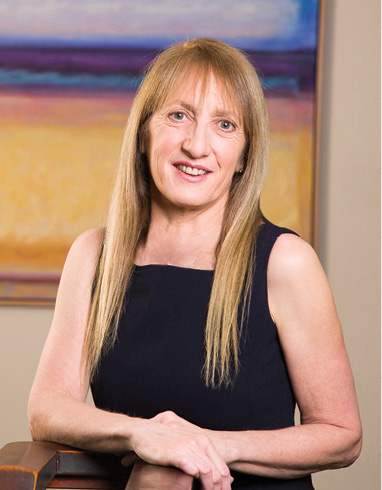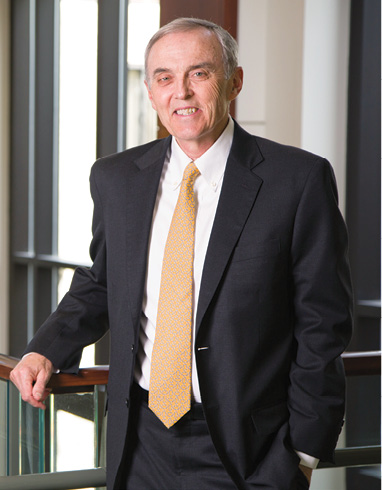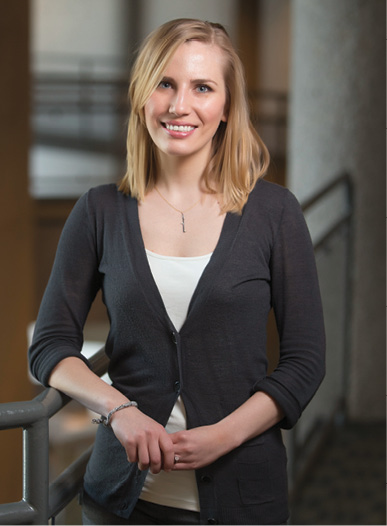By Seth Robertson
Midway through Vanderbilt’s Ph.D. Program in Law and Economics, Caroline Cecot found herself in a dilemma. The six-year program, designed for students who want to pursue careers at universities, research institutions or in government, requires a third-year paper, which serves as a bridge to the dissertation process. Her third-year paper completed, Cecot already had a topic in mind for her dissertation, as well as some leads on data. She even had a rough idea of how the chapters would take shape. By all measures it should have been fairly straightforward.
The only problem was the topic she’d chosen: It simply didn’t inspire her.

But fortunately for Cecot, program co-director Joni Hersch knew just how to handle the situation. “Joni saw that my heart wasn’t in it,” said Cecot, J.D./Ph.D.’14. “She explained that writing a dissertation is such a long process that almost everyone dislikes their topic toward the end. So it’s important to start out loving it. That was the best advice I could have gotten, because I doubt I would have finished if I’d stuck with that original topic.”
Cecot ended up changing her focus to shale gas development—specifically the risk and uncertainty surrounding horizontal drilling and hydraulic fracturing, or “fracking.” The topic happened to fall right in line with the expertise of W. Kip Viscusi, the program’s other co-director. Viscusi, the University Distinguished Professor of Law, Economics, and Management (the first such University Distinguished Professor in Vanderbilt’s history), is the founding editor of the Journal of Risk and Uncertainty and has written more than 20 books and 330 articles, most of which deal with different aspects of health and safety risks.
Cecot, who was a postdoctoral research scholar at the law school teaching risk and environmental regulation, considers both Viscusi and Hersch to be exceptional mentors. While Viscusi has been more of an academic mentor to her, Cecot says Hersch, professor of law and economics, has been just as important on a personal level.

An expert in the areas of employment discrimination and empirical law and economics, Hersch has made the program particularly welcoming toward women. In fact, more than half of the program’s graduates are female—an unusual statistic for a field like economics. During the 2012–13 academic year, several female students, including Cecot, showed their appreciation by nominating Hersch for the mentoring award from Vanderbilt’s Margaret Cuninggim Women’s Center, which she later won.
“Kip and Joni are always available for the students. That’s not the case in most Ph.D. programs,” Cecot said. “They always want to know what the big picture is: What’s your goal? And how is what you’re working on going to help you achieve that goal?”
This hands-on approach to mentoring has been an emphasis ever since Viscusi and Hersch, who are married, launched the Law and Economics program in 2006. They were motivated to start the new program after what they’d observed—or more accurately, what they hadn’t observed—while teaching at Harvard Law School. “At Harvard,” Viscusi said, “there were students getting Ph.D.’s in economics and J.D.’s at the same time, but the people in the law school assumed the economics department was mentoring them, while the economics people assumed it was the other way around. As a result, nobody really was monitoring the students’ progress. Joni and I knew we could do it better.”
Viscusi and Hersch worked with Chancellor Nicholas S. Zeppos (then provost of Vanderbilt) and Ed Rubin, then dean of the law school (now University Professor of Law and Political Science), to come up with a plan for the program. The couple credits both administrators for having a strong vision for educational innovation, as Hersch puts it.
The Ph.D. in Law and Economics is the first program of its kind to be administratively based in a law school. It’s also unique in that it fully integrates analytical training in economics theory and methodology with the study of law. Viscusi and Hersch developed 11 new Ph.D. courses specifically for the program. Fields of study include law and economics, risk and environmental regulation, labor markets and human resources, and behavioral law and economics. “We’re ‘trans-institutional’ in the truest sense of the word,” Viscusi said. “It’s not like we’re just pairing an economics department degree with a J.D. We’re fully integrated.”
As Viscusi and Hersch proudly point out, the students who come through the program reflect a rare blend of strengths across disciplines. They excel at not only the quantitative demands of economics but the verbal rigors of law school as well. Five of them, in fact, have held senior editorial positions on the Vanderbilt Law Review, and thus far all eligible students have secured prestigious judicial clerkships.
“It’s a rare student for whom this is the right thing,” Hersch said. “They have to have both high quantitative and high verbal scores. If you think about it, we’re getting these almost impossible people who want to take on these questions of broader social interest, and they’re doing it in impressive fashion.”
Caroline Cecot, J.D./Ph.D. in Law and Economics ’14

Caroline Cecot’s interest in how people respond to uncertain risks and how governments can regulate them led her to a doctoral dissertation topic fraught with controversy: hydraulic fracturing, or fracking.
Cecot, a native of Brooklyn, New York, earned an undergraduate degree in economics at Harvard and worked as a researcher at the AEI-Brookings Joint Center for Regulatory Studies in Washington, D.C., for two years before starting her J.D./Ph.D. at Vanderbilt. Her interest in energy extraction was sparked by the surge in fracking and the environmental concerns that it raises. “The emphasis on environmental risks as a Ph.D. program field and the law school’s great faculty strengths in environmental law were ideal preparation for exploring the diverse issues raised by fracking efforts,” she said.
As she considered her dissertation’s focus, Cecot realized that comparing Pennsylvania, where fracking is allowed, with New York, which has not allowed fracking since 2008, could offer insights on how communities and property values are affected by the perceived risks of shale development. “I found that perceived risks can cause real losses to property values—and perceived risks to water sources play a particularly important role when people decide whether to allow fracking in their communities,” she said. “Areas with a greater reliance on private water wells as drinking water sources were more likely to ban fracking.” She concluded that governments seeking to promote shale development should first create effective regulatory systems to manage water-contamination risks. “I suspect that people would be more receptive to fracking if they knew there’s a reliable system in place that would ensure the quick discovery of any possible water contamination and guarantee that any problems would be fixed and any environmental harms remediated,” she said.
Cecot moves to New York City this summer for a clerkship with Judge Raymond Lohier of the U.S. Court of Appeals for the Second Circuit. She ultimately hopes to join the legal academy. “Economics is my toolkit, and law—and its potential effect on people’s decision-making and behaviors—is my subject matter,” she said. “I loved my classes at Vanderbilt. I got a lot of my ideas in classes.”